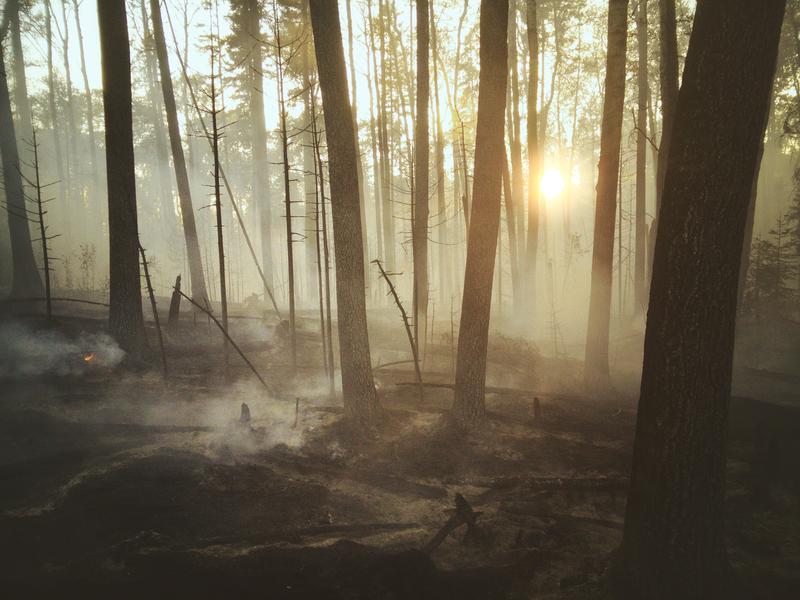by Sébastien Luc Butler
December 12, 2023
Sébastien Luc Butler holds an MFA from the University of Virginia, where he was a Poe/Faulkner Fellow in poetry, and served as poetry editor for Meridian. His poems have appeared in or are forthcoming from Narrative Magazine, Pleiades, Black Warrior Review, Southeast Review, the minnesota review, Four Way Review, The Journal, Southern Indiana Review, and elsewhere. The recipient of the 2021 Hopwood Award for Poetry, a finalist for the 2023 Black Warrior Review Poetry Contest, and a semi-finalist for the Red Wheelbarrow Poetry Prize, his writing and reviews can be found at Fifty Grande and Foreword Reviews. He currently serves as an assistant poetry editor at West Trade Review. Hailing from Michigan, he resides in Brooklyn with his partner and their cat.
River City Fires by Derek Annis; Driftwood Press; 54 pages; $9.99.
Derek Annis’s chapbook River City Fires inhabits an abstract and dislocated landscape. It's a territory marked by the elemental: water, fire, sky. There is only “the town”, “the river”, “the wolves”, or “the trees.” As Carl Phillips notes in his judge’s citation, these poems make “bewilderment itself a world.” Subsequent poems root us in more recognizable places, like the “family picnic in the public park” of “Potato Salad,” or a flight “from Texas to Earth” in “Descent.” But as is already visible in the latter example, everything always remains askew—as if Texas were, somehow, not part of Earth. Yet how resonant such a sentence is with the experience of flying. In moments such as these, River City Fires’s dissociated syntax and surrealist bursts of speech manage to stimulate the reader’s thoughts and emotions. More often though, the chapbook favors mind over heart. Without specific references to a clear geography, the poems turn inward upon themselves, focused on their own linguistic and aesthetic revelry more than a discernable theme. The point of River City Fires is this placing of language above coherence.
Shuttering between two main forms—a highly enjambed short line poem without punctuation and prose poem blocks—River City Fires possesses a logic wholly its own. At their best, these poems are perfect embodiments of Shklovsky’s defamiliarization theory, by which literature recasts the world in strangeness in order to recapture the world’s vibrancy and vitality. In “Manifest,” fathers “forced open the mouth of the forest, made it shout a city across the valley.” The sights and sounds of July 4th are reshaped into fireworks which “squirm in the dirt like worms / regurgitated from a robin’s / eye socket.” Within these poems, a clear frame is placed around all the linguistic unmooring, with the ideas of manifest destiny and independence day respectively. The mythic images of America, of westward expansion and of patriotic celebration, are twisted here, reframed and made ugly. Their unsavory truths are laid bare through purposely untrue language. In poems like these and in “Descent,” the surrealist mock is clearly pointed. “A priest with crucifix burns on his face” sits next to the speaker. He’s been hired by “the airline to maintain the safety of the plane…through prayer.” The absurdity of the scene is apparent, as is the parody of the evangelical right, and the boarder trust put in religious figures. But the message is unstable. The priest proceeds to “separate woodpeckers from their wings and discard the later into the aisle.” The focus of the poem departs from religious parody in favor of surrealist oddity. This stands in for the chapbook as a whole. While River City Fires seems invested in reframing political narratives, a systematic stance or goal is not discernable. Once again, the prioritization of the immediacy of surreal language undermines a concrete perspective.
Phillips notes that these are “poems whose meanings I can’t always parse—and I don’t feel I’m supposed to…” While I agree with the first part, I can’t say I do with the latter. Your experience of River City Fires will likely depend on the degree to which you center decipherable meaning in your enjoyment of poetry. Without conceptual anchors, poems like “Holy City”, “Night Watch”, and “Lightwork” baffle more than they do anything else. Waffles are stuffed in boots. Dogs eat peanut butter chandeliers. There’s a symbolic, deep imagist quality to these poems, reminiscent of Merwin’s early work. But the more obvious influence is Ashbery. These poems delight in their subversion of expected synaptic meaning: “a tiger prepares to strike sparks from the foreskin of a golden calf.” There is no unifying image system but rather an endless series of cascading, wild metaphors. This leaves poems feeling like amusement rides. They’re full of thrills and surprises, and one can certainly choose to ride them again. But they’re not going to move one to tears or to identify with a broader human pathos. Poems are like houses. They need spaces of openness otherwise no one could live in them. But that openness can only exist because of moments of grounding—beams and studs and floors—which provides a reader with a firm jumping off point.
River City Fires subordinates all other forms of meaning beneath the immediacy of raw and unique language. Certain ideas carry across poems, such as the aforementioned elemental descriptions. The eyes and mouth repeat frequently, as well as images of rifles and flames. These hint towards an address of gender and climate change—the latter’s presence felt more strongly in the chapbook’s closing poems. But these are only impressions, vague ripples which reference concrete ideas. While I would have preferred further cohesion, I can understand Annis’s prioritizing of image and sound---the raw, illogical power of what poet Matthew Zapruder calls “actualized language.” At the end of the day, poems do not mean, they are. The destabilizing and exhilarating experience one has while reading these is undeniable. This saves the chapbook and results in a group of poems where many succeed. For example, “Pitch,” whose ghostly “thin men” in “formal gowns” sing a song which becomes smoke so sweet “it makes children weep.” In a scene such as this, when the images layer and build evocatively, River City Fires can astonish with its ingenuity and craft, its language transportive and transcendent.
©2023 Iron Oak Editions LLC
__________________________________________________________________________________________________________________________________________________________________________
__________________________________________________________________________________________________________________________________________________________________________
__________________________________________________________________________________________________________________________________________________________________________
__________________________________________________________________________________________________________________________________________________________________________
__________________________________________________________________________________________________________________________________________________________________________
Razorblades Sweet As Pears in Derek Annis’s River City Fires
POETRY REVIEW
Stay Connected to Our Literary Community. Subscribe to Our Newsletter
Image by Landon Parenteau from Pexels




